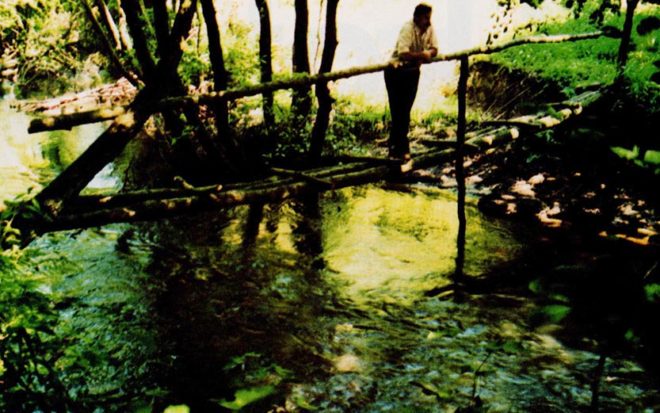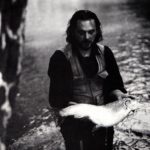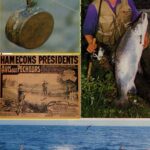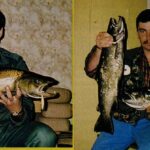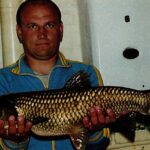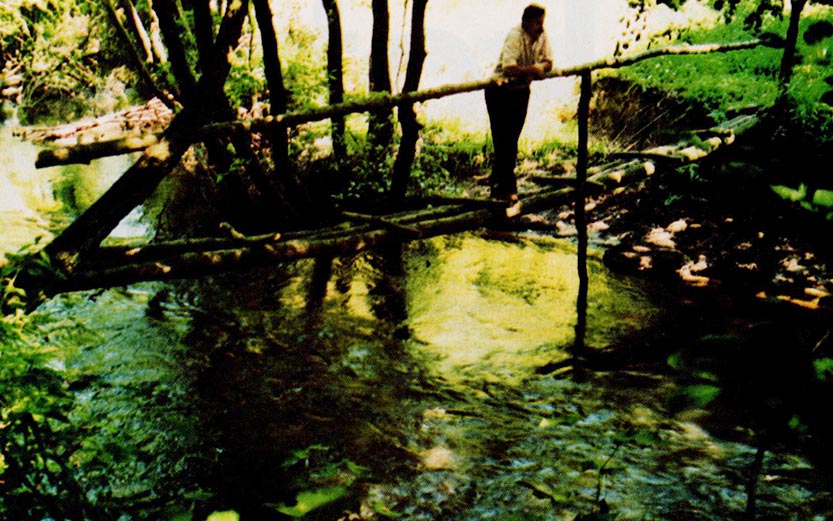 Pewnej ciemnej listopadowej nocy na rzece Mołstowa koło Żukowa powstała kładka wraz z przemyślnie zbudowaną przy niej podwójną zastawką-pułapką. Wyciosana z grubych olchowych bali (z poręczą, żeby pan kłusownik miał się o co oprzeć, kiedy utrudzony całonocnym kłuciem troci i rozgrzany mocniejszą popitką poczuje zmęczenie), była kawałkiem rzetelnej kłusowniczej roboty.
Pewnej ciemnej listopadowej nocy na rzece Mołstowa koło Żukowa powstała kładka wraz z przemyślnie zbudowaną przy niej podwójną zastawką-pułapką. Wyciosana z grubych olchowych bali (z poręczą, żeby pan kłusownik miał się o co oprzeć, kiedy utrudzony całonocnym kłuciem troci i rozgrzany mocniejszą popitką poczuje zmęczenie), była kawałkiem rzetelnej kłusowniczej roboty.
Trocie ciągnące w górę rzeczki na tarło trafiały na swej drodze na piętrzącą strumień przeszkodę. Dla troci taka zastawka to nic… Bierze niewielki rozpęd, skok i już pluska w basenie -odgrodzona od rzeki kolejną przegrodą. Zanim jednak zdąży zebrać siły do następnego skoku, już trzepoce przebita ościeniem czyhającego na kładce kłusownika…
Szczęśliwie strażnicy natrafili na to kłusownicze dzieło. Powyrywali głęboko powbijane w dno strumienia pale, niszcząc pułapkę. Ostała się jedynie owa… kładka ku wygodzie z rzadka zaglądających na Mołstową wędkarzy.
Piszę o tej przemyślnej pułapkowej konstrukcji nie bez przyczyny. Wszystko wskazuje bowiem na to, iż w tym roku do Mołstowej troci wpłynie więcej niż zwykle. Powodem jest remont urządzeń hydrotechnicznych elektrowni w Trzebiatowie. Wchodzące z morza trocie nie natrafiające na tę przeszkodę, pociągną dalej w górę Regi i z całą pewnością część stada do swych miłosnych igraszek wybierze przepiękną (szczególnie w lesistych obcinkach) i dość jeszcze czystą Mołstową. Zachęceni łatwą do przewidzenia w tym roku obfitością szlachetnych ryb, kłusownicy z pewnością „zaszaleją”, specjalizując się w budowie kolejnych zastawek-pułapek, stawianiu siatek, bądź w „sportowym” kłuciu ryb w czasie nocnego brodzenia z hakiem w jednej ręce i wodoszczelną latarką w drugiej.
Na kłusowniczy łów wybiorą się też z pewnością specjaliści od nadziewania troci na hak (podobno „najlepsi” z zamkniętymi oczami potrafią namacać w głębokim wykrocie ukrytą gdzieś pod korzeniami rybę), piromani lubiący „wystrzałowe” głuszenie ryb oraz „elektrycy-kablarze”, ciągnący kabel od najbliższej linii energetycznej i „elektrycy” przychodzący z własnym prądem nad wodę, czyli z przenośnymi ruskimi generatorami w torbie czy plecaku. Przedstawiony czarny scenariusz może się okazać w tym roku wykrakaną przeze mnie rzeczywistością.
Zdaję sobie sprawę z niezmiernie trudnego (i kosztownego) pilnowania wszystkich dopływów Regi, do których będzie wstępowała idąca w tym roku na tarło troć i dlatego mam nadzieję, że tegoroczne odłowy tarlaków (chyba zostaną przeprowadzone mimo utrudnień związanych z trzebiatowskim remontem spiętrzenia), dla zainkubowania pobranej ikry -wyrównają straty poniesione na skutek zwiększonego niechybnie kłusownictwa.
Wrócę do Regi. Kłusownictwo na tej rzecze jest, być może, mniejsze niż na innych pomorskich rzekach. Zapewne i z tego powodu, iż od ujścia aż po
Nowielice rzeka płynie na odsłoniętym terenie. Wszelka bardziej zorganizowana i na większą skalę działalność kłusownicza byłaby więc widoczna jak na dłoni. A kłusownik wiadomo – gapiów przy swojej robocie nie lubi. Chociaż…
Bezczelność amatorów nielegalnego połowu ryb nie ma granic. W zeszłym roku miejscowi wędkarze zasypali ziemią i gruzem oraz przegrodzili zabetonowaną kratą rowek melioracyjny (tzw. dren), którym część ciągnących na tarło troci omijała spiętrzenie trzebiatowskiej elektrowni. Rowek ów był oczywiście atrakcyjny dla kłusowników, których trudno było upilnować przez dwadzieścia cztery godziny na dobę. Długo to nie postało: którejś nocy krata została wyrwana z betonowej okowy.
Aby tego dokonać kłusol musiał się chyba posłużyć ciągnikiem!?
Na koniec wrócę jeszcze do lipcowego zanieczyszczenia rzeki, o czym donosiła prasa. Od trzebiatowskich wędkarzy dowiaduję się, że ropa, która wyciekła do Regi koło Łobza została szczęśliwie wyłapana w 90 procentach.
W Trzebiatowie i w Nowielicach wędkarze nie spostrzegli nawet śladów tego wycieku. Nie maleją tylko ich lokalne zanieczyszczenia – nie ubywa ścieków z przetwórni ryb i komunalnych. Wszystko to jest szczególnie widoczne przy niskim stanie wody w rzece. Mimo to, troci w Redze (i to grubych) naprawdę jest sporo.
